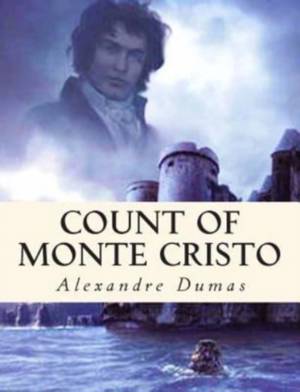
Wil je zeker zijn dat je cadeautjes op tijd onder de kerstboom liggen? Onze winkels ontvangen jou met open armen. Nu met extra openingsuren op zondag!
- Afhalen na 1 uur in een winkel met voorraad
- Gratis thuislevering in België vanaf € 30
- Ruim aanbod met 7 miljoen producten
Wil je zeker zijn dat je cadeautjes op tijd onder de kerstboom liggen? Onze winkels ontvangen jou met open armen. Nu met extra openingsuren op zondag!
- Afhalen na 1 uur in een winkel met voorraad
- Gratis thuislevering in België vanaf € 30
- Ruim aanbod met 7 miljoen producten
Zoeken
€ 32,45
+ 64 punten
Uitvoering
Omschrijving
The Count of Monte Cristo (is an adventure novel by French author Alexandre Dumas. Completed in 1844, it is one of the author's most popular works, along with The Three Musketeers. The story takes place in France, Italy, islands in the Mediterranean, and in the Levant during the historical events of 1815-1838. It begins from just before the Hundred Days period (when Napoleon returned to power after his exile) and spans through to the reign of Louis-Philippe of France. The historical setting is a fundamental element of the book. An adventure story primarily concerned with themes of hope, justice, vengeance, mercy and forgiveness, it focuses on a man who is wrongfully imprisoned, escapes from jail, acquires a fortune and sets about getting revenge on those responsible for his imprisonment. However, his plans have devastating consequences for the innocent as well as the guilty.The book is considered a literary classic today. According to Luc Sante, "The Count of Monte Cristo has become a fixture of Western civilization's literature, as inescapable and immediately identifiable as Mickey Mouse, Noah's flood, and the story of Little Red Riding Hood."Chapter 1. Marseilles-The Arrival. "On the 24th of February, 1815, the look-out at Notre-Dame de la Garde signalled the three-master, the Pharaon from Smyrna, Trieste, and Naples. As usual, a pilot put off immediately, and rounding the Chateau d'If, got on board the vessel between Cape Morgion and Rion island. Immediately, and according to custom, the ramparts of Fort Saint-Jean were covered with spectators; it is always an event at Marseilles for a ship to come into port, especially when this ship, like the Pharaon, has been built, rigged, and laden at the old Phocee docks, and belongs to an owner of the city..." The ship drew on and had safely passed the strait, which some volcanic shock has made between the Calasareigne and Jaros islands; had doubled Pomegue, and approached the harbor under topsails, jib, and spanker, but so slowly and sedately that the idlers, with that instinct which is the forerunner of evil, asked one another what misfortune could have happened on board. However, those experienced in navigation saw plainly that if any accident had occurred, it was not to the vessel herself, for she bore down with all the evidence of being skilfully handled, the anchor a-cockbill, the jib-boom guys already eased off, and standing by the side of the pilot, who was steering the Pharaon towards the narrow entrance of the inner port, was a young man, who, with activity and vigilant eye, watched every motion of the ship, and repeated each direction of the pilot. The vague disquietude which prevailed among the spectators had so much affected one of the crowd that he did not await the arrival of the vessel in harbor, but jumping into a small skiff, desired to be pulled alongside the Pharaon, which he reached as she rounded into La Reserve basin. When the young man on board saw this person approach, he left his station by the pilot, and, hat in hand, leaned over the ship's bulwarks. He was a fine, tall, slim young fellow of eighteen or twenty, with black eyes, and hair as dark as a raven's wing; and his whole appearance bespoke that calmness and resolution peculiar to men accustomed from their cradle to contend with danger. "Ah, is it you, Dantes?" cried the man in the skiff. "What's the matter? and why have you such an air of sadness aboard?" "A great misfortune, M. Morrel," replied the young man, -"a great misfortune, for me especially! Off Civita Vecchia we lost our brave Captain Leclere." "And the cargo?" inquired the owner, eagerly. "Is all safe, M. Morrel; and I think you will be satisfied on that head. But poor Captain Leclere-" "What happened to him?" asked the owner, with an air of considerable resignation. "What happened to the worthy captain?" "He died." "Fell into the sea?" "No, sir, he died of brain-fever in dreadful agony."
Specificaties
Betrokkenen
- Auteur(s):
- Illustrator(s):
- Uitgeverij:
Inhoud
- Aantal bladzijden:
- 794
- Taal:
- Engels
Eigenschappen
- Productcode (EAN):
- 9781500263393
- Verschijningsdatum:
- 20/06/2014
- Uitvoering:
- Paperback
- Formaat:
- Trade paperback (VS)
- Afmetingen:
- 189 mm x 246 mm
- Gewicht:
- 1392 g

Alleen bij Standaard Boekhandel
+ 64 punten op je klantenkaart van Standaard Boekhandel
Beoordelingen
We publiceren alleen reviews die voldoen aan de voorwaarden voor reviews. Bekijk onze voorwaarden voor reviews.











